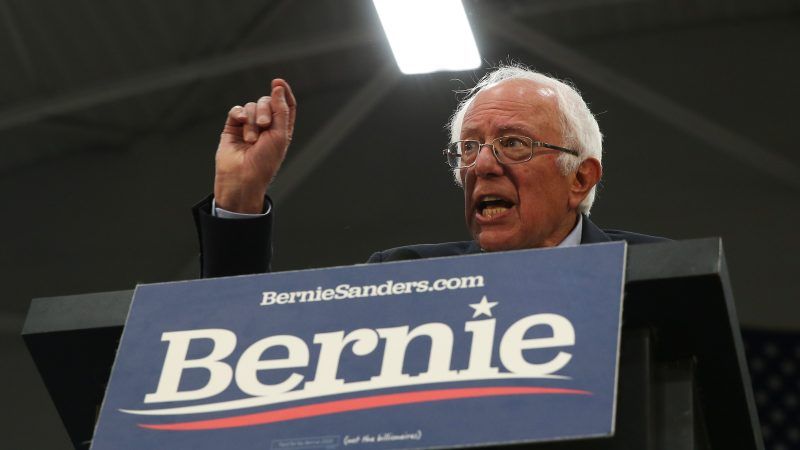It Seems Highly Doubtful That a President Sanders Could Unilaterally Legalize Marijuana
While the Controlled Substances Act generally gives the attorney general the authority to deschedule drugs, it also invokes treaty obligations that seem to preclude doing that with cannabis.

Democratic presidential contender Bernie Sanders recently unveiled a plan to legalize marijuana within the first 100 days of his presidency by removing it from the schedules of the Controlled Substances Act through administrative action. But because of the way that law interacts with international treaty obligations, it's not clear the Vermont senator could legally do that as president.
Since Congress passed the Controlled Substances Act (CSA) in 1970, marijuana has been listed in Schedule I, the most restrictive category. Schedule I is officially reserved for drugs with a "high potential for abuse" that have "no currently accepted medical use" and are so dangerous that they cannot be used safely, even under medical supervision.
It is highly debatable, to say the least, that marijuana meets any of those criteria, let alone all three. But over the years, most recently in 2016, the Drug Enforcement Administration (DEA), the Justice Department agency to which the attorney general has delegated his rescheduling authority, has repeatedly rejected petitions asking it to take marijuana off Schedule I, where it sits alongside heroin and LSD, above supposedly safer drugs such as cocaine, morphine, and methamphetamine.
The fact that the DEA has even considered those petitions, of course, shows that new legislation is not needed to move marijuana from Schedule I to a less restrictive category. But Sanders wants to go further than that. If elected president, he says, he would issue "an executive order that directs the Attorney General to declassify marijuana as a controlled substance." While the CSA does give the executive branch the authority to reclassify marijuana, completely declassifying it is another matter.
"I think it is very unlikely that the attorney general could remove marijuana from the schedules entirely," Alex Kreit, a drug policy expert at Thomas Jefferson School of Law in San Diego, told me when the issue came up during the Obama administration. Although the CSA gives the attorney general the power to "remove a drug or other substance entirely from the schedules," it also says that "if control is required by United States obligations under international treaties, conventions, or protocols in effect on October 27, 1970, the Attorney General shall issue an order controlling such drug under the schedule he deems most appropriate."
Since the 1961 Single Convention on Narcotic Drugs requires its signatories (which include the United States) to criminalize production, possession, and distribution of cannabis for nonmedical purposes, this reference to treaty obligations seems to bar the attorney general from descheduling, as opposed to rescheduling, marijuana. Cannabis "requires a lot of control" under the Single Convention, noted Eric Sterling, executive director of the Criminal Justice Policy Foundation, who helped write federal drug legislation in the 1980s as counsel to the House Judiciary Committee. "Cannabis is supposed to be controlled like opium and opiates." Then again, Kreit noted, other CSA provisions "seem to contemplate situations where the U.S. does not accept international scheduling determinations."
It is at least highly doubtful that a President Sanders could unilaterally legalize marijuana. I have asked his campaign to address this issue and will update this post if and when I receive a response.


Show Comments (46)